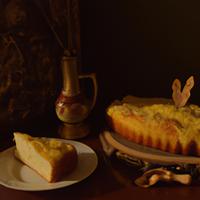
1 serving (80 grams) contains 280 calories, 3.2 grams of protein, 12.0 grams of fat, and 40.0 grams of carbohydrates.

Log this food in SnapCalorie

Nutrition Information
Calories |
828.4 | ||
|---|---|---|---|
% Daily Value* |
|||
| Total Fat | 35.5 g | 45% | |
| Saturated Fat | 18.9 g | 94% | |
| Polyunsaturated Fat | 0 g | ||
| Cholesterol | 118.3 mg | 39% | |
| Sodium | 710.1 mg | 30% | |
| Total Carbohydrates | 118.3 g | 43% | |
| Dietary Fiber | 2.4 g | 8% | |
| Sugars | 71.0 g | ||
| protein | 9.5 g | 19% | |
| Vitamin D | 0 mcg | 0% | |
| Calcium | 118.3 mg | 9% | |
| Iron | 3.6 mg | 20% | |
| Potassium | 236.7 mg | 5% | |
* Percent Daily Values are based on a 2,000 calorie diet. Your daily values may be higher or lower depending on your calorie needs.
Food Attributes
Source of Calories
About Cake vanilla
Vanilla cake is a classic dessert originating from Western cuisine, celebrated for its rich, buttery flavor and soft, moist texture. Made with a combination of flour, sugar, eggs, butter, milk, leavening agents, and vanilla extract, the cake is versatile and often paired with frosting or toppings to create a variety of flavors. While it provides energy due to its carbohydrate content, vanilla cake is high in sugar and fat, making it a treat best enjoyed in moderation. It lacks significant amounts of fiber, vitamins, or minerals but can be enhanced with nutrient-rich ingredients like fresh fruit or whole wheat flour. Vanilla cake is a staple for celebrations, offering indulgence and comfort through its familiar taste, though it should ideally be part of an overall balanced diet.



